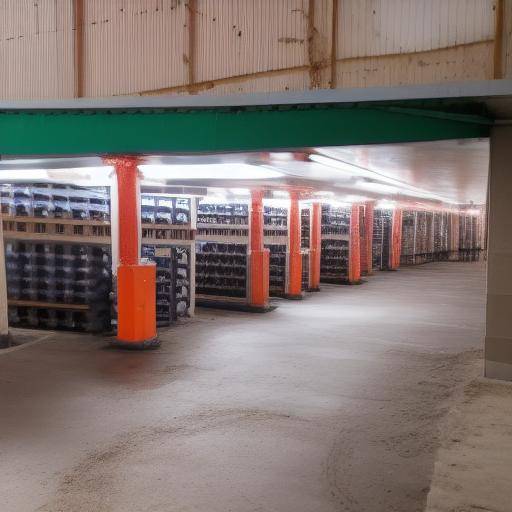
The region of Moldova, located in Eastern Europe, is famous for its underground cellars, some of which have kilometres of tunnels. These spaces not only house the winemaking tradition of the region, but also reveal fascinating stories linked to the Soviet era. In this article, we will explore the rich history of these wineries, delving into the tradition of ancestral wines, dark tastings and the influence of Soviet history in the viticulture of the region. Join us on this journey through the history and wine traditions of Moldova.
History and Origins of the Subterranean Bodegas in Moldova
The underground wineries of Moldova have their roots in the 15th and 16th centuries, when Orthodox monks began to dig tunnels to store and produce wines, taking advantage of the ideal conditions of temperature and humidity. These ancestral practices gave rise to a unique wine tradition that has endured over the centuries.
With the arrival of the Soviet era, the wineries reached a new relevance. During this period, they expanded considerably, extending over miles underground. The underground wineries became a symbol of cultural and economic resistance, preserving the wine traditions of the region in difficult times.
The Tradition of Ancestral Wines in Moldova
The tradition of ancient wines in Moldova dates back centuries and is based on winemaking methods transmitted from generation to generation. These wines are made with native grapes, cultivated in the fertile lands of the region, and subject to ancestral fermentation processes that highlight the unique characteristics of the earth.
The ancient wines of Moldova are appreciated for their historical and cultural wealth, as well as for their exquisite taste. Artisan winemaking and respect for traditional practices give these wines a distinctive personality that makes them unique in the contemporary wine world.
Dark Tasting: A Unique Sensory Experience
Dark tastings offer wine lovers a unique sensory experience, where the senses are sharpened by depriving the sense of sight. This type of tasting allows participants to focus on the aromas, flavors and textures of wine without visual distractions, which intensifies the appreciation of their organoleptic qualities.
In the underground warehouses of Moldova, the dark tastings acquire a special dimension, as the darkness is combined with the mystical atmosphere of the underground tunnels. Participants dive into a sensory journey that enhances the connection between wine, history and the environment, creating an unforgettable experience.
Influence of Soviet History in the Viticulture of Moldova
The Soviet history left an imprint on the viticulture of Moldova. During the Soviet period, the underground wineries played a crucial role in preserving the cultural and wine identity of the region, resisting political and economic pressures.
The Soviet influence is reflected in the architecture of the wineries, the vinification techniques and the mentality of the winemakers. Despite the challenges, the viticulture of Moldova managed to keep its historical heritage alive, preserving native grape varieties and traditional vinification methods that are now appreciated worldwide.
Conclusion
The underground wineries of Moldova with miles of tunnels are witnesses of a rich heritage winegrove, rooted in the tradition of ancestral wines, the exciting tastings in the dark and the resilience in the face of Soviet history. Through these underground monuments, wine lovers can explore centuries of tradition and culture, immersed in an experience that combines history, art and passion for wine. Moldavia, with its underground wineries, offers an unforgettable journey to the origins of wine and the history of a town rooted in its tradition.
Frequently asked questions
1. What is the story behind the underground warehouses in Moldova?
The history of the underground wineries of Moldova dates back to the 15th and 16th centuries, when Orthodox monks began to dig tunnels to produce and store wine. During the Soviet era, these wineries expanded significantly, becoming symbols of cultural resistance and preservation of the wine tradition.
2. What makes the ancient wines of Moldova special?
The ancient wines of Moldova stand out for their craftsmanship, using methods transmitted over generations. They are also made with indigenous grapes, which gives them a distinctive and rooted character in the land of the region.
3. What are the dark tastings about and why are they so special in the underground warehouses?
Dark tastings are sensory experiences where the participant is deprived of the sense of sight to focus on the aromas and flavors of wine. In the underground wineries of Moldova, this experience is enriched by the unique atmosphere of the tunnels, intensifying the connection between wine, history and the environment.
4. How has Soviet history influenced the viticulture of Moldova?
The Soviet history left a profound mark on the viticulture of Moldova, influencing the architecture of the wineries, the vinification techniques and the mentality of the winemakers. Despite the challenges, the viticulture of Moldova managed to keep its historical heritage alive, preserving native grape varieties and traditional vinification methods.
5. What are the main reasons for visiting the underground wineries in Moldova?
The underground wineries of Moldova offer a unique combination of history, wine tradition and sensory experiences. Visitors can immerse themselves in the region's rich winemaking heritage, explore the history of wineries and enjoy the exceptionality of ancestral wines in a unique setting.
6. How are the underground warehouses of Moldova adapting to current trends?
The underground wineries of Moldova are integrating into their tourist proposals new experiences, such as dark tastings and guided tours focused on Soviet history, adapting to contemporary trends and offering visitors a wide and enriching perspective of the viticulture of the region.
In short, the underground wineries in Moldova are real historical and wine treasures that offer a unique immersion in history, tradition and passion for wine. Through ancient wines, dark tastings and the influence of Soviet history, these wineries are a window to the legacy and resilience of the viticulture of Moldova.
